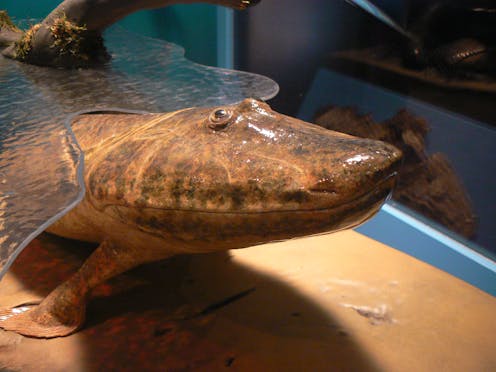Your turn!wec01 wrote: ↑January 18th, 2020, 7:32 pm1. conusdchen22 wrote: ↑January 13th, 2020, 6:26 am Specimen A:
https://media.sketchfab.com/models/484e ... 1cf3c.jpeg
Specimen B:
https://i.ebayimg.com/images/g/AigAAOSw ... s-l300.jpg
1. Identify specimen A.
2. What structure does specimen A hunt with?
3. Which epoch did specimen A first appear in?
4. Identify specimen B.
5. Which end (top or bottom) was the anterior?
2. a harpoon like radula that extends from the proboscis
3. eocene
4. cypraea
5. bottom
Fossils B/C
-
dchen22
- Member

- Posts: 59
- Joined: February 1st, 2019, 12:40 pm
- Division: C
- Has thanked: 5 times
- Been thanked: 3 times
Re: Fossils B/C
Fossils, Circuits, Cell Bio, RemSen
Medals: 7
Medals: 7
-
wec01
- Member

- Posts: 220
- Joined: February 22nd, 2019, 4:02 pm
- Division: Grad
- State: VA
- Has thanked: 0
- Been thanked: 0
Re: Fossils B/C
1. What does a “coal gap” in the fossil record following the Permian extinction suggest?
2. Why did “meandering” streams change to “braided” streams after the Permian extinction?
3. What organism temporarily replaced reefs after the Permian extinction?
2. Why did “meandering” streams change to “braided” streams after the Permian extinction?
3. What organism temporarily replaced reefs after the Permian extinction?
2019 Division C Nationals Medals:
4th place Fossils
5th place Sounds of Music
2nd place Thermodynamics
4th place Fossils
5th place Sounds of Music
2nd place Thermodynamics
-
ChimpLopez
- Member

- Posts: 51
- Joined: May 9th, 2019, 5:06 am
- Division: C
- State: PA
- Has thanked: 0
- Been thanked: 1 time
- Contact:
Re: Fossils B/C
1. The Coal gap in the fossil record suggest a lack of coal-forming plants. This lack of plants could have been from the losses of the Permian extinction itself, or new environmental conditions that affected the plants.
2. Meandering steams changed to braided streams following the change in climate from the End-Permian extinction to the early Jurassic. The landscape became very dry and a lot of vegetation was lost, which allowed the streams to become braided.
3. Bivalves became the reef builders. In specific, Rudists.
I also go by Chino.
2017-2018 Events: Herpetology, Ecology
2018-2019 Events: Herpetology, Fossils, Dynamic Planet, Geologic Mapping
2019-2020 Events: Ornithology, Fossils, Protein Modeling
Red Sweatshirt Guy (RSG)
2017-2018 Events: Herpetology, Ecology
2018-2019 Events: Herpetology, Fossils, Dynamic Planet, Geologic Mapping
2019-2020 Events: Ornithology, Fossils, Protein Modeling
Red Sweatshirt Guy (RSG)
-
wec01
- Member

- Posts: 220
- Joined: February 22nd, 2019, 4:02 pm
- Division: Grad
- State: VA
- Has thanked: 0
- Been thanked: 0
Re: Fossils B/C
Number 3 should be stromatolites, which took over when corals died. Rudists appeared later on. Other than that looks good. Your turn!ChimpLopez wrote: ↑January 27th, 2020, 5:48 am1. The Coal gap in the fossil record suggest a lack of coal-forming plants. This lack of plants could have been from the losses of the Permian extinction itself, or new environmental conditions that affected the plants.
2. Meandering steams changed to braided streams following the change in climate from the End-Permian extinction to the early Jurassic. The landscape became very dry and a lot of vegetation was lost, which allowed the streams to become braided.
3. Bivalves became the reef builders. In specific, Rudists.
2019 Division C Nationals Medals:
4th place Fossils
5th place Sounds of Music
2nd place Thermodynamics
4th place Fossils
5th place Sounds of Music
2nd place Thermodynamics
-
ChimpLopez
- Member

- Posts: 51
- Joined: May 9th, 2019, 5:06 am
- Division: C
- State: PA
- Has thanked: 0
- Been thanked: 1 time
- Contact:
Re: Fossils B/C

Might be a little easy but here goes :/
1. Identify the this organism?
2. Where and when was this specimen discovered?
3. What is the significance of the discovery of this specimen?
4. Name some characteristics of this specimen that links it to modern tetra pods.
I also go by Chino.
2017-2018 Events: Herpetology, Ecology
2018-2019 Events: Herpetology, Fossils, Dynamic Planet, Geologic Mapping
2019-2020 Events: Ornithology, Fossils, Protein Modeling
Red Sweatshirt Guy (RSG)
2017-2018 Events: Herpetology, Ecology
2018-2019 Events: Herpetology, Fossils, Dynamic Planet, Geologic Mapping
2019-2020 Events: Ornithology, Fossils, Protein Modeling
Red Sweatshirt Guy (RSG)
- Name
- Member

- Posts: 434
- Joined: January 21st, 2018, 4:41 pm
- Division: C
- State: NY
- Pronouns: He/Him/His
- Has thanked: 49 times
- Been thanked: 46 times
Re: Fossils B/C
ChimpLopez wrote: ↑January 28th, 2020, 3:03 pm
Might be a little easy but here goes :/
1. Identify the this organism?
2. Where and when was this specimen discovered?
3. What is the significance of the discovery of this specimen?
4. Name some characteristics of this specimen that links it to modern tetra pods.
1. tiktaalik
2. canada 2004
3. represents a transition fossil from fish to tetrapods
4. rib bones, mobile neck, primitive lungs
South Woods MS, Syosset HS '21
BirdSO TD/ES
Past Events: Microbe, Invasive, Matsci, Fermi, Astro, Code, Fossils
BirdSO TD/ES
Past Events: Microbe, Invasive, Matsci, Fermi, Astro, Code, Fossils
1st place MIT Codebusters 2019-2020 1st place NYS Fermi Questions (2019), Astronomy and Codebusters (2021) Science Olympiad Founder's Scholarship winner
-
ChimpLopez
- Member

- Posts: 51
- Joined: May 9th, 2019, 5:06 am
- Division: C
- State: PA
- Has thanked: 0
- Been thanked: 1 time
- Contact:
Re: Fossils B/C
Great Job, except if you want to be more specific, it should be Nunavut, CanadaName wrote: ↑January 28th, 2020, 7:50 pmChimpLopez wrote: ↑January 28th, 2020, 3:03 pm
Might be a little easy but here goes :/
1. Identify the this organism?
2. Where and when was this specimen discovered?
3. What is the significance of the discovery of this specimen?
4. Name some characteristics of this specimen that links it to modern tetra pods.
1. tiktaalik
2. canada 2004
3. represents a transition fossil from fish to tetrapods
4. rib bones, mobile neck, primitive lungs
Your Turn!
I also go by Chino.
2017-2018 Events: Herpetology, Ecology
2018-2019 Events: Herpetology, Fossils, Dynamic Planet, Geologic Mapping
2019-2020 Events: Ornithology, Fossils, Protein Modeling
Red Sweatshirt Guy (RSG)
2017-2018 Events: Herpetology, Ecology
2018-2019 Events: Herpetology, Fossils, Dynamic Planet, Geologic Mapping
2019-2020 Events: Ornithology, Fossils, Protein Modeling
Red Sweatshirt Guy (RSG)
- Name
- Member

- Posts: 434
- Joined: January 21st, 2018, 4:41 pm
- Division: C
- State: NY
- Pronouns: He/Him/His
- Has thanked: 49 times
- Been thanked: 46 times
Re: Fossils B/C
Answer these questions about Titanis
1. What time period did Titanis live in?
2. T/F? Unlike most other birds, the bones of Titanis skulls are completely fused together
3. Give two possible theories of how Titanis killed its prey
4. What are the closest living relatives to Titanis today?
5. The earliest Titanis fossils found was in Texas dating back 5 million years ago. Why would this be considered unusual?
6. What type of habitat did Titanus inhabit?
7. What other predators did Titanus compete with?
8. Why did Titanus die out during the Pleistocene era?
1. What time period did Titanis live in?
2. T/F? Unlike most other birds, the bones of Titanis skulls are completely fused together
3. Give two possible theories of how Titanis killed its prey
4. What are the closest living relatives to Titanis today?
5. The earliest Titanis fossils found was in Texas dating back 5 million years ago. Why would this be considered unusual?
6. What type of habitat did Titanus inhabit?
7. What other predators did Titanus compete with?
8. Why did Titanus die out during the Pleistocene era?
South Woods MS, Syosset HS '21
BirdSO TD/ES
Past Events: Microbe, Invasive, Matsci, Fermi, Astro, Code, Fossils
BirdSO TD/ES
Past Events: Microbe, Invasive, Matsci, Fermi, Astro, Code, Fossils
1st place MIT Codebusters 2019-2020 1st place NYS Fermi Questions (2019), Astronomy and Codebusters (2021) Science Olympiad Founder's Scholarship winner
-
dchen22
- Member

- Posts: 59
- Joined: February 1st, 2019, 12:40 pm
- Division: C
- Has thanked: 5 times
- Been thanked: 3 times
Re: Fossils B/C
Name wrote: ↑January 29th, 2020, 12:15 pm Answer these questions about Titanis
1. What time period did Titanis live in?
2. T/F? Unlike most other birds, the bones of Titanis skulls are completely fused together
3. Give two possible theories of how Titanis killed its prey
4. What are the closest living relatives to Titanis today?
5. The earliest Titanis fossils found was in Texas dating back 5 million years ago. Why would this be considered unusual?
6. What type of habitat did Titanus inhabit?
7. What other predators did Titanus compete with?
8. Why did Titanus die out during the Pleistocene era?
1. Neogene, Quaternary 2. True 3. One theory is that it used its robust beak to pummel prey. Another theory is that it smashed prey on rocks like the seriemas. 4. Seriemas 5. The Great American Interchange had not happened yet. 6. Grassland 7. Wolves, saber-toothed cats 8. Competitive pressures and climate change
Fossils, Circuits, Cell Bio, RemSen
Medals: 7
Medals: 7
- Name
- Member

- Posts: 434
- Joined: January 21st, 2018, 4:41 pm
- Division: C
- State: NY
- Pronouns: He/Him/His
- Has thanked: 49 times
- Been thanked: 46 times
Re: Fossils B/C
yup your turndchen22 wrote: ↑February 2nd, 2020, 3:28 pmName wrote: ↑January 29th, 2020, 12:15 pm Answer these questions about Titanis
1. What time period did Titanis live in?
2. T/F? Unlike most other birds, the bones of Titanis skulls are completely fused together
3. Give two possible theories of how Titanis killed its prey
4. What are the closest living relatives to Titanis today?
5. The earliest Titanis fossils found was in Texas dating back 5 million years ago. Why would this be considered unusual?
6. What type of habitat did Titanus inhabit?
7. What other predators did Titanus compete with?
8. Why did Titanus die out during the Pleistocene era?1. Neogene, Quaternary 2. True 3. One theory is that it used its robust beak to pummel prey. Another theory is that it smashed prey on rocks like the seriemas. 4. Seriemas 5. The Great American Interchange had not happened yet. 6. Grassland 7. Wolves, saber-toothed cats 8. Competitive pressures and climate change
South Woods MS, Syosset HS '21
BirdSO TD/ES
Past Events: Microbe, Invasive, Matsci, Fermi, Astro, Code, Fossils
BirdSO TD/ES
Past Events: Microbe, Invasive, Matsci, Fermi, Astro, Code, Fossils
1st place MIT Codebusters 2019-2020 1st place NYS Fermi Questions (2019), Astronomy and Codebusters (2021) Science Olympiad Founder's Scholarship winner
Who is online
Users browsing this forum: No registered users and 0 guests

